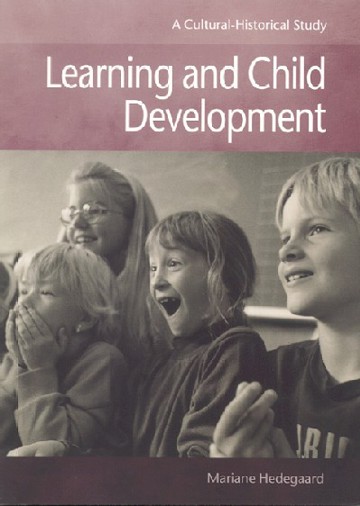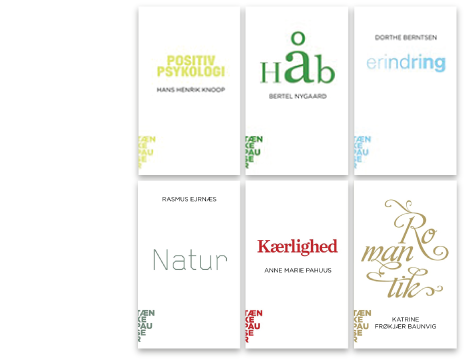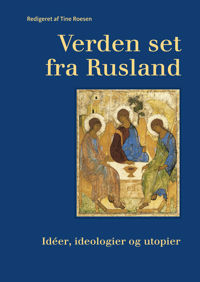
Learning and Child Development
A Cultural-Historical Study
Mere om bogen
Om bogen
Learning and Child Development diskuterer børns udvikling som en individuel aktivitet og en socio-kulturelt bestemt aktivitet.
I bogens første del diskuteres aktuelle teorier om sammenhængen mellem tænkning og social viden og mellem indlæring og motivering.
I den anden del beskrives et undervisningsforløb i faget historie i 4. og 5. klasse. Forløbet bygger på principperne for "zonen for nærmeste udvikling" - som er blevet formuleret af den russiske psykolog Vygotsky. Denne zone bestemmes af, hvad barnet i øjeblikket kan, og hvad det kunne forestille sig at lære.
Bogens empiriske del følger tre børn, mens de deltager i projektet. De udvikler personlige særpræg, samtidig med at de udvikler fælles motiver, begreber og tankestrategier.
Learning and Child Development henvender sig til alle, der interesserer sig for skolebørns udvikling og undervisning. Bogen er en bearbejdet oversættelse af bogen Tænkning, viden, udvikling fra 1995 (Aarhus Universitetsforlag).
Indholdsfortegnelse
Chapter 1: Introduction:
Aim of the book
Contextual levels in the analyses of school children's psychic development
Children's conceptual thinking and motive development
Chapter 2: The significance of societal forms of knowledge and thinking for children's concept formation and thinking:
The anchoring of knowledge in societal practice
Societal knowledge and personal cognition
Societal forms of knowledge
The significance of the different kinds of knowledge for school teaching
Children's appropriation of subject-matter knowledge and its transformation into personal cognition and concepts
Subject-matter knowledge and its consequence for personal everyday concept formation and thinking modes
Knowledge forms, everyday cognition and education
Chapter 3: Thinking in a socio-cultural and historical perspective:
Localisation of thinking: In the mind or in social practice?
Thinking as a socio-cultural practice
Content and procedures of thinking - learning thinking modes
Chapter 4: Goals, motives, motivation and cognition:
The relationship between human needs and motives
Goals and formation of motives
Motive, cognition and the formation of personality
Motivation creates motives and motives create motivation
Chapter 5: Learning, development and social practice:
School age as a specific stage in child development
Apprenticeship learning and teaching
Learning activity and theoretical thinking
Combining situated learning and thinking with theoretical learning and thinking – 'The Double Move' in teaching
Chapter 6: The principles for conducting 'The Double Move' in teaching: Exemplified by a teaching experiment in the subject of history:
The zone of proximal development as a principle of learning
The teaching design: The educational experiment
Didactics of the teaching experiment
Chapter 7: Method:
The case study method
Observation of three children
Categories of interpretation for the case analyses
Chapter 8: Cecilie's learning activity in the fourth grade:
Objectives and description categories
Problem formulation phase
Model formulation phase
Model extension phase
Model variation phase
Construction and evaluation phase
Conclusion on Cecilie's development of motives, thinking and concept formation in the fourth grade
Chapter 9: Loke's learning activity in the fourth grade:
Problem formulation phase
Model formulation phase
Model extension phase
Model variation phase
Construction and evaluation phase
Conclusion on Loke's development of motives, thinking and concept formation in the fourth grade
Chapter 10: Cecilie in the fifth grade - greater independence:
Problem formulation phase
Model formulation phase: Model use for the Viking age
Model extension phase for the Middle Ages: Focus on the concept of society
Communicating with other children on the conceptualising of change in society
The numerous activities relating to the evaluation and extension of the model
Using the historical model of society to go beyond the study of history
Conclusion on Cecilie's development of motives, thinking and concept formation in the fifth grade
Chapter 11: Morten's learning activity in the fifth grade:
The phases of problem formulation and model use
Model extension phase for the Middle Ages: Focus on the concept of society
Communicating with other children on the conceptualisation of change in society
The numerous activities relating to the evaluation and extension of the model
Using the historical model of society to go beyond the study of history
Conclusion on Morten's development of motives, thinking and concept formation in the fifth grade
Chapter 12: Thinking, the formation of concepts and motives as socio-culturally based facets of personality:
The aims of this chapter
Traditions of subject methodology and their influence on children's thinking strategies
Each child's motives create individuality in his or her development
Societal and cultural practice as a basis for children's appropriation of personal thinking modes, concepts and motives
Appendix
Bibliography
Index
Pressen skrev
Stefanie Chye Mind, Culture, & Activity Journal
"... enriching current theoretical debates… Hedegaard's theorizing is ambitious and impressive. [This book] makes important contributions to both theory and practice ... [It] opens new horizons for educators and researchers alike. The data, meticulously described and rich in detail, is interesting and strikes many a chord with the experiences of educators ... her teaching project is a pioneering step… [The book is] a true contribution, and it will be of real interest to all those involved in the areas of education, psychology and child development."
Netop udkommet
Forlaget skriver:
21 maj 2025
Forårets sidste Bogtorsdag 12. juni
Vær med når Aarhus Universitetsforlag sammen med Det Kgl. Bibliotek fejrer forfatterne bag vores nyeste udgivelser til Bogtor…
5 maj 2025
Lagersalg 3. juni 2025
Sæt kryds i kalenderen, og kig forbi, når vi holder stort sommerlagersalg tirsdag den 3. juni 2025 fra kl. 12.00 til 18.00. K…
24 april 2025
Bogtorsdag 8. maj 2025
Vær med når Aarhus Universitetsforlag sammen med Det Kgl. Bibliotek fejrer forfatterne bag vores nyeste udgivelser til Bogtor…




